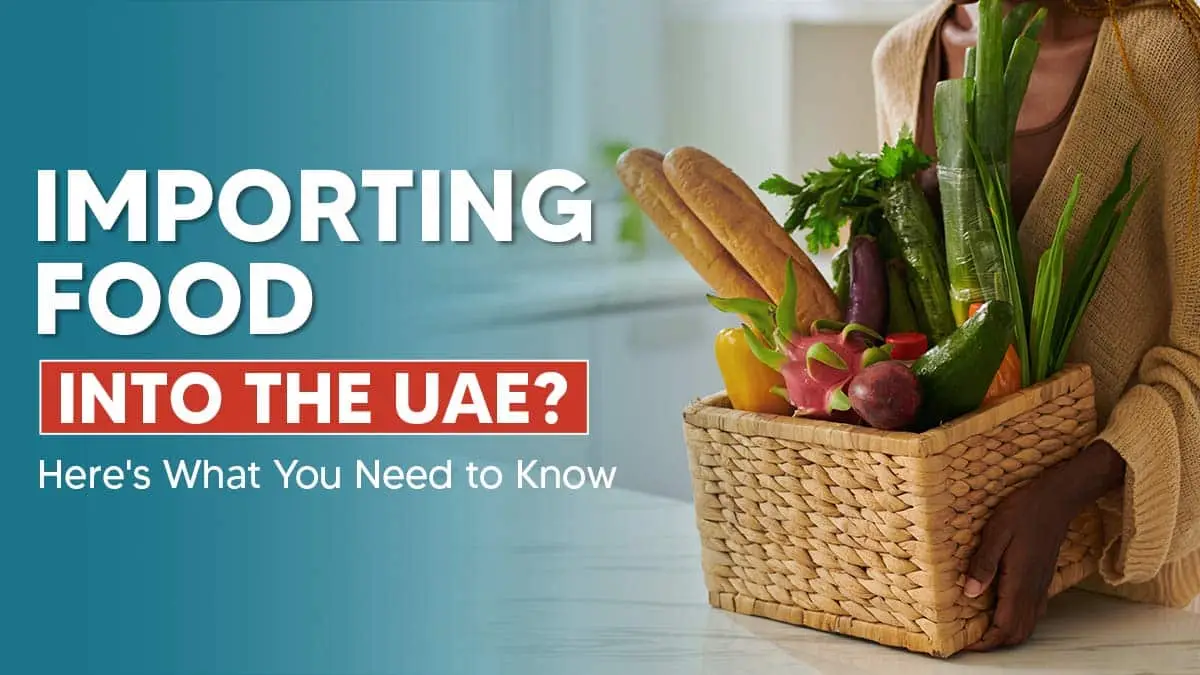The UAE is one of the fastest-growing markets for food imports because of its diverse population and thriving economy. With over 80% of its food supply coming from imports, the country relies heavily on food products from around the world to meet the needs of both locals and expatriates. From fresh fruits and vegetables to packaged goods and specialty items, the UAE is a major player in the global food trade industry.
What makes the UAE such an attractive market for food imports? Its geographical location, excellent infrastructure, and growing demand for international food products make it a hotspot for food businesses. The country’s expat community, which makes up around 88% of the population, creates a demand for a variety of global cuisines, making it a lucrative opportunity for importers.
However, importing food into the UAE isn’t as simple as just shipping in products. So, how to import food products to UAE successfully? While the market is full of opportunities, it’s essential to understand that the UAE has strict regulations in place to ensure food safety and quality. Following these guidelines is essential to avoid delays, fines, or even having your products rejected.
Here we will guide you through the steps you need to follow and the important regulations you must know to successfully import food products into the UAE.
UAE Food Import Market
Food consumption trends in the UAE are largely influenced by its multicultural society, with a significant portion of its population being expatriates. There is a rising demand for fresh produce, organic foods, and healthier options as consumers become more health conscious. Packaged and processed foods are also popular, driven by busy lifestyles and convenience.
According to recent reports, the UAE’s food market is expected to grow at a compound annual growth rate (CAGR) of 4.5% between 2021 and 2026, reflecting the increasing demand for both local and international food products.
Key Sectors that Depend on Food Imports
Several key sectors in the UAE rely on food imports to sustain operations:
- Hospitality Industry: The UAE is home to world-class hotels and restaurants that offer a variety of international cuisines, heavily dependent on imported ingredients.
- Retail Sector: Supermarkets and hypermarkets such as Carrefour and Lulu stock shelves with imported products from around the globe to meet consumer demands.
- Food Service Providers: Catering companies and food delivery services, which have grown rapidly in recent years, also rely on a consistent supply of imported food items.
Commonly Imported Food Products in the UAE
The UAE imports a wide range of food products, including:
- Grains: Wheat, rice, and barley are among the most commonly imported staples.
- Dairy Products: Milk, cheese, yogurt, and other dairy products are in high demand, especially from countries like the USA, Australia, and Europe.
- Fresh Produce: Fruits and vegetables from countries such as India, Egypt, and China.
- Packaged and Processed Foods: Ready-to-eat meals, snacks, and beverages are increasingly popular due to busy urban lifestyles.
- Meat and Seafood: Halal-certified meat from countries like Brazil and Australia, as well as seafood from nearby and distant suppliers.
Key Regulations and Authorities Governing Food Imports in the UAE
Importing food products into the UAE requires adherence to a comprehensive regulatory framework. Several key authorities oversee and enforce these regulations:
1. Federal Law No. 10 of 2015 on Food Safety
This law establishes the foundation for food safety in the UAE, outlining the responsibilities of food businesses and the standards for food handling, processing, and distribution. It aims to protect public health by ensuring that all food products meet strict safety criteria.
2. Ministry of Climate Change and Environment (MOCCAE)
MOCCAE is responsible for developing and implementing policies related to food safety and security. It oversees the import and export of food products, ensuring compliance with national standards and international agreements.
3. Emirates Authority for Standardization and Metrology (ESMA)
ESMA sets the standards for food products in the UAE, including labelling requirements, packaging, and quality specifications. Importers must ensure that their products conform to ESMA’s standards to gain market access.
4. Dubai Municipality
For imports into Dubai, the Dubai Municipality’s Food Safety Department plays a crucial role. It manages the registration and inspection of imported food products through the Food Import and Re-export System (FIRS), ensuring that all food items meet local safety and quality standards.
5. Gulf Cooperation Council (GCC) Food Safety Laws
As a member of the GCC, the UAE adheres to regional food safety regulations and standards. These laws facilitate trade among member states and ensure a unified approach to food safety across the region.
How to Import Food Products into the UAE
Importing food products into the UAE requires careful planning and adherence to strict regulations. Here’s a step-by-step process:
1. Business Registration and Licensing
The first step to importing food products into the UAE is to set up a legally registered business. Here’s what you need to do:
- Decide whether you want to operate as a mainland company or set up in a free zone. A mainland company allows you to trade within the UAE market, while a free zone company offers benefits like 100% foreign ownership but requires working with a local distributor for UAE sales.
- You’ll need to apply for a General Trading License or Food Trading License, depending on the scope of your activities. This license allows you to import, store, and distribute food products.
- Ensure your business is registered with the relevant local authorities, such as the Department of Economic Development (DED) and the local Chamber of Commerce.
Before you can start importing, you must register with the Ministry of Climate Change and Environment (MOCCAE) or relevant authorities such as the Dubai Municipality’s Food Safety Department.
2. Product Registration
Before importing, register your food products with the appropriate UAE authorities, such as the Dubai Municipality’s Food Safety Department or the Abu Dhabi Agriculture and Food Safety Authority (ADAFSA). This ensures your products meet local standards and regulations.
3. Compliance with Labeling and Packaging Requirements
Ensure that all food products have labels in both Arabic and English, detailing ingredients, nutritional information, country of origin, expiration dates, and any allergen warnings. Compliance with the Gulf Cooperation Council (GCC) Standardization Organization’s guidelines is essential.
4. Obtain Necessary Certifications
Secure health certificates from the country of origin, confirming that the products are safe for consumption. For meat and poultry products, obtain Halal certification from an Islamic organization recognized by UAE authorities.
5. Prepare Import Documentation
Essential Documents Include:
- Commercial Invoice
- Packing List
- Bill of Lading or Airway Bill (a legal document issued by the carrier to the shipper, acknowledging receipt of the goods for shipment)
- Certificate of Origin
- Health and Halal Certificates
- Import Permit
6. Submit Import Declaration
Submit an import declaration through the UAE’s online customs portal, providing all necessary documentation and details about the shipment. Pay any applicable customs duties and taxes during this process.
7. Inspection and Clearance
Upon arrival, the shipment will undergo inspection by UAE food safety authorities to verify compliance with local standards. Ensure that the products are stored and transported under appropriate conditions to pass the inspection.
8. Distribution and Sale
Once cleared, the food products can be distributed to retailers, wholesalers, or directly to consumers within the UAE market. Maintain records of all transactions and ensure ongoing compliance with UAE food safety regulations.
Detention of Imported Food Consignment
The detention of an imported food consignment in the UAE occurs when food products do not meet the required safety, quality, or regulatory standards. The authorities may detain the consignment to further inspect or assess the products before they are allowed to enter the market.
Imported food consignments can be detained for several reasons, including but not limited to:
- Missing or incorrect labels (e.g., no Arabic labels, incomplete expiry dates).
- Lack of required certifications (e.g., Halal, health certificates).
- Incomplete or incorrect documents like invoices or certificates.
- Signs of spoilage, contamination, or substandard quality.
- Food exposed to unsuitable conditions (e.g., wrong temperature).
Detention Process
- Inspection and Testing: Authorities inspect the consignment for compliance with health and safety standards.
- Notification: Importers are informed of the detention and given a chance to correct the issues.
- Correction or Re-export: Importers can correct labeling or provide missing documents, or the consignment may be sent back to the country of origin.
- Destruction: Unsafe goods may be destroyed if they cannot be rectified.
HACCP Regulations
The Hazard Analysis and Critical Control Point (HACCP) system is a food safety management system adopted by the UAE for food imports. It focuses on:
- Recognizing potential hazards that could affect food safety, from raw materials to finished products.
- Monitoring specific points in the food production and supply chain where risks must be controlled to ensure safety.
- Implementing measures to prevent hazards from occurring at each stage of food handling.
HACCP certification is required for certain food businesses and products, particularly those involved in meat and poultry, seafood, fish processing, dairy & processed foods, and food processing & manufacturing.
Partnering with Shuraa Business Setup
Importing food products into the UAE involves several important steps, from registering your business and getting the right licenses to following food safety rules and passing inspections. With the growing demand for organic, sustainable, and healthy food options in the UAE, the food import market offers great opportunities.
But it’s crucial to follow the UAE’s regulations to make sure your food products are accepted. Not meeting these standards can lead to delays, extra costs, or even having your goods held up.
Partnering with a business setup consultant in the UAE can make the whole process much easier. At Shuraa Business Setup, we can help with everything from company registration and licensing to handling customs and ensuring your products meet the local requirements.
By working with us, you can avoid the hassle, stay compliant with local laws, and focus on growing your food import business in the UAE. Let us make your import process simple and smooth. Get a free consultation today at +971 4 4081900, WhatsApp at +971 50 7775554, or [email protected].
*Please note that the information provided in this blog is for general informational purposes only and may be subject to changes due to updates in government policies and regulations.







